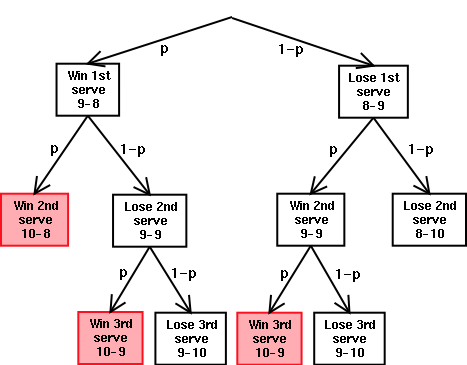Squash
Problem
In the game of squash, players gain "points" by winning "rallies". If the "server" wins a rally, he or she wins a point; otherwise the service changes hands with no points gained.
Normally the game is won by the first player to reach 9 points -- typically by 2 or more points. But if the score reaches 8-8 then the person due to receive serve can call "9" (in which case the first to reach 9 wins) or call "10" (in which case the first to reach 10 wins).
I'm playing a game against Ivana Slogovitch, the Russian squash champion. I estimate that my chance of winning any particular rally against her, regardless of whether I serve or not, is p. The score gets to 8-8 and I am due to receive serve. Should I call "9" or "10"?
Getting Started
Student Solutions
In the game of squash, the player who serves is the only player who can win the next point. If the server loses the rally, no points are scored and the other player serves next. Note that if in two consecutive rallies both servers lose the rally, then the situation is exactly the same as it was before the two serves. This is not taken into account below where the tree diagram and solution from Allan Ling apply to the simpler problem where the player who wins a rally wins the point whether serving or receiving. Can you see how to re-draw the tree diagram to give the solution for the game of squash?
If I call '9', then I win with probability p.
If I call '10', then there are 6 possible outcomes, shown by the tree diagram. 
The winning outcomes are shown in red. Calculating the probabilities of these three outcomes, we find that the total is p 2 + p(1-p)p + (1-p)p 2 = 3p 2 - 2p 3 .
Now we compare this to p to see which is larger.
When p< 0.5, then p> 3p 2 -2p 3 .
When p=0.5, then p=3p 2 -2p 3 .
When p> 0.5, then p< 3p 2 -2p 3 .
Therefore, in this simplified situation, if p is smaller than 0.5, I should call '9', and if p is greater than 0.5, I should call '10'. If p=0.5, I have an equal chance of winning on both choices.
Now what happens playing according to the rules of squash?
Teachers' Resources
Why do this problem?
A real world problem involving conditional probability.Possible approach
Half the class might work through the problem with a probability of 0.4 of winning rallies against Ivana to see whether calling 9 or 10 isadvantageous, and the other half might work on the problem with a probability of 0.3. Then a class discussion, and drawing tree diagrams of the possibilites, might help everyone to solve the problem for a general value of p and find the critical value.Key question
What are the possible outcomes of the next rally, which is served by Ivana, if my probability of winning the rally is p?What happens if Ivana loses that rally?
